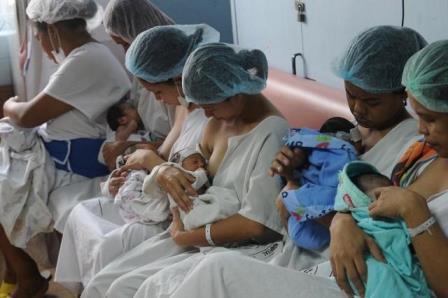
Breastfeeding has long been linked to a variety of health benefits in babies, and a new study suggests that bacteria transferred from mothers to their nursing infants might be at least partly responsible.
Researchers focused on what's known as the microbiome, or all of the bacteria, viruses and fungi that live in and on the body. They tested 107 mother-baby pairs for organisms on women's breasts and in their milk, and they also examined babies' stool as a way of determining what types of organisms were in the infant gut microbiome.
While they found distinct types of bacteria in milk, breast tissue and infant stool, researchers also found infants' gut microbial communities matched the bacteria in their mothers' milk and on their mothers' skin much more than it resembled samples from other women in the study.
That suggests each mother's milk was a major contributor to her own infant’s gut microbiome.
"We were able to show that there are bacteria in milk and that these bacteria could be traced to bacteria in infant stools," said senior study author Dr. Grace Aldrovandi, chief of the division of infectious diseases at Mattel Children's Hospital at the University of California, Los Angeles.
"This supports the hypothesis that milk microbes are a mechanism by which breastfeeding provides benefit," Aldrovandi said by email.
Pediatricians recommend that mothers exclusively breastfeed infants until at least 6 months of age because it is tied to reduced risk for babies of ear and respiratory infections, sudden infant death syndrome, allergies, childhood obesity and diabetes.
Mothers may benefit too, with longer periods of breastfeeding linked to lower risks of depression, bone deterioration and certain cancers.
Based on lab tests of bacteria found in milk, on skin and in stool in the current study, researchers estimated that babies who got at least 75 percent of their nutrition from breast milk during the first month of life received about 28 percent of their gut bacteria from their mother's milk. These babies also got about 10 percent of their gut bacteria from mothers' skin and 62 percent from sources researchers didn't determine.
The more babies nursed, the more their gut bacterial community changed to resemble what was found in their mother's milk.
And in babies who got more of their nutrition exclusively from breastfeeding, microbial communities were slightly more diverse overall and different microbes predominated compared to babies who breastfed less.
One limitation of the study is that researchers didn't assess the origins of the breast milk bacteria or other bacterial communities from the mother that might have contributed to the infant gut microbiome, the authors note. Nor did they assess any effects on the babies’ health based on differences in their microbiomes.
Still, the results build on previous research suggesting that the infant gut microbiome is different for breast-fed and formula-fed babies, said Dr. Alexander Khoruts, a researcher at the University of Minnesota in Minneapolis who wasn't involved in the study.
"We've always assumed that most of these microbes come from the mother," Khoruts said by email. "They found that breastfeeding is the major source of microbial transfer during the early months of life, and I think the study provides supportive evidence for the current recommendations of exclusive breastfeeding for the first six months and continued breastfeeding to 12 months."
Many factors can influence the infant gut microbiome, including breastfeeding, whether babies arrived by vaginal or surgical delivery and antibiotic use, noted Jose Clemente, a researcher in the genetics and genomic sciences at the Icahn School of Medicine at Mount Sinai in New York.
"The beneficial effects of breastfeeding are well known, and this study provides further evidence by demonstrating that probiotic bacteria found in breast milk can be transferred to the infant," Clemente, who wasn't involved in the study, said by email. "Every little bit helps, so even some amount of breast milk can be a source of beneficial bacteria for babies."
Source: Reuters
http://www.reuters.com/article/us-health-breastfeeding-microbiome-idUSKBN1852EC
 FR
FR EN
EN AR
AR








